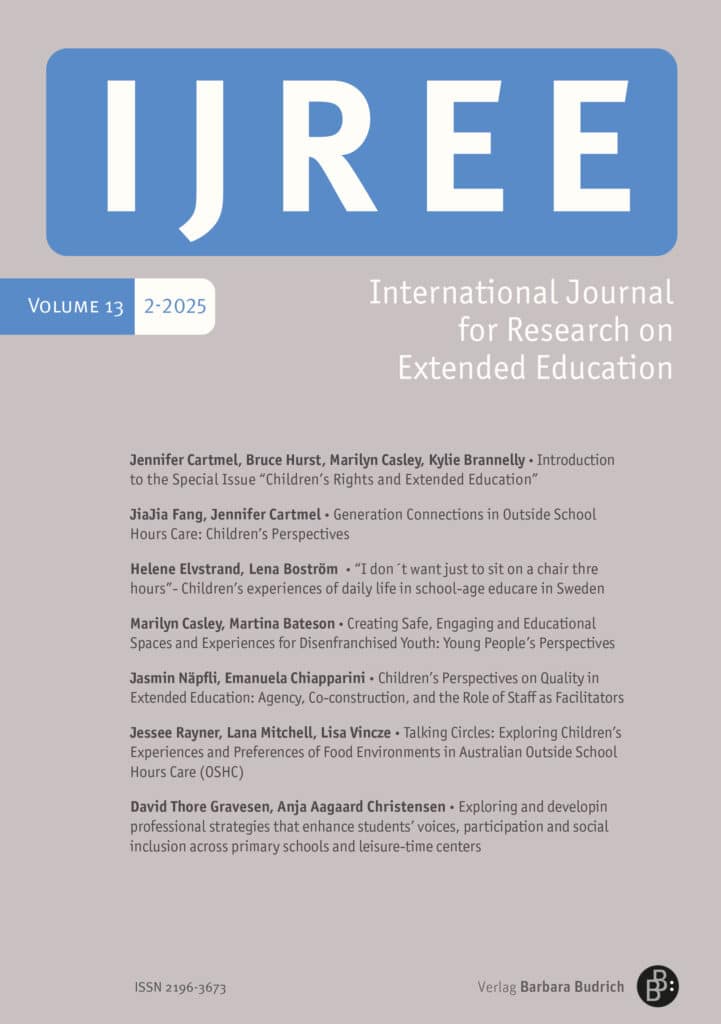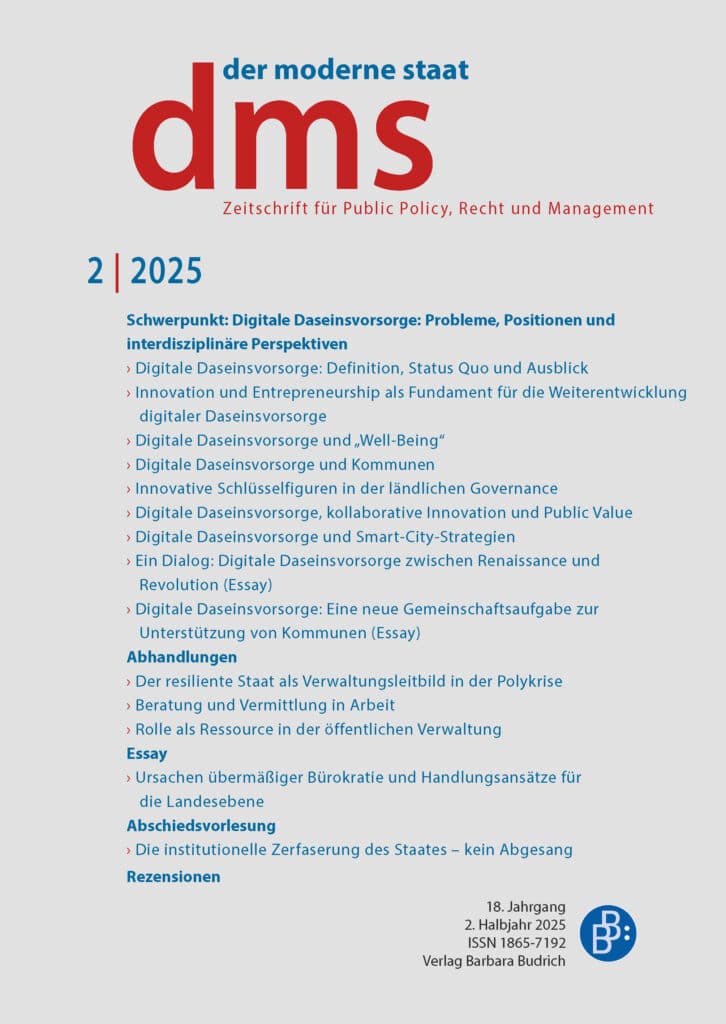Informationen zur Zeitschrift
Home » Publications » INSEP Special Issue 2020 (2-2015) | Positive non-binary and / or genderqueer sexual ethics and politics
INSEP Special Issue 2020 (2-2015) | Positive non-binary and / or genderqueer sexual ethics and politics
Erscheinungsdatum : 27.10.2020
0,00 € - 33,00 €
Inhalt
INSEP – Journal of the International Network for Sexual Ethics & Politics
Special Issue 2020 (2-2015): Positive non-binary and / or genderqueer sexual ethics and politics
Articles
Lucy Nicholas: Introduction to the Special Issue: Positive non-binary and / or genderqueer sexual ethics and politics
Luke Armitage: Explaining backlash to trans and non-binary genders in the context of UK Gender Recognition Act reform
Lucy Nicholas / Sal Clark: Leave those kids alone: On the uses and abuses and feminist queer potential of non-binary and genderqueer
Reubs Walsh / Gillian Einstein: Transgender embodiment: a feminist, situated neuroscience perspective
Ynda Jas: Sexuality in a non-binary world: redefining and expanding the linguistic repertoire
Son Vivienne: Surveillance, and the boundaries of binary gender: flashpoints for queer ethics
Reviews
Blase A. Provitola: Beyond Trans: Does Gender Matter? Heath Fogg Davis, New York: New York University Press, 2017
Roz Ward: The Politics of Everybody: Feminism, Queer Theory, and Marxism at the Intersection Holly Lewis, London: Zed Books 2016
Download of Table of Contents / Inhaltsverzeichnis herunterladen
Download of single articles (Open Access/fee-based): insep.budrich-journals.com
You can register here for the INSEP alert.
Einzelbeitrag-Download (Open Access/Gebühr): insep.budrich-journals.com
Sie können sich hier für den INSEP-Alert anmelden.
Zusätzliche Informationen
| Publisher | |
|---|---|
| ISSN | 2196-6931 |
| eISSN | 2196-694X |
| Volume | 3. Jahrgang 2015 |
| Edition | 2 (Special Issue 2020) |
| Date of publication | 27.10.2020 |
| Scope | 128 |
| Language | Englisch |
| Format | 17 x 24 cm |
| DOI | |
| Open Access-Lizenz | |
| Homepage |
Autor*innen
Keywordsbacklash, boundary patrol, categorisation, cultural neuroscience, feminism, Gender, Gender Recognition Act, genderqueer, identity politics, language, moral panic, neuroplasticity, non-binary, non-binary genders, queer ethics, radical feminism, sexuality, somatosensation, surgery, surveillance, Trans, Transgender, transnormativity
Abstracts
Explaining backlash to trans and non-binary genders in the context of UK Gender Recognition Act reform (Luke Armitage)
This paper analyses responses to the 2018 Gender Recognition Act reform consultation in the UK, exploring reasons behind the widespread anti-trans sentiment in this context. It compares the conservative Christian roots of traditional opposition to LGBT rights, which is still the major source of anti-trans politics in the US, with the rise in prominence of a specific feminist opposition to trans rights in the last few years in the UK. It then explores why the beliefs of relatively small groups have had such a compelling influence on a wider audience in the general population. It argues that the gendered socialisation we all experience through education, media, and political institutions creates a baseline belief in gender determinism and oppositional sexism, and as many people’s main source of information about trans people is the recent surge in related media, a trans moral panic propagated through mainstream and social media easily creates misinformed beliefs about trans issues. A major conclusion of this paper is that trans people have been constructed in the public imagination predominantly in terms of threat- threat to investment in gendered norms, threat to one’s own gender identity, and for marginalised groups including women and also other LGBT people, threat to their own in-group resources and desires for assimilation into mainstream culture. Anti-trans sentiment is therefore not only about ideology, but also has important emotional components that should not be overlooked when considering ways to tackle transphobia. Key words: trans, non-binary, Gender Recognition Act, moral panic, backlash, transnormativity
» Download Single Contribution Free of Charge (Budrich Journals) / Einzelbeitrag kostenlos herunterladen (Budrich Journals)
Leave those kids alone: On the uses and abuses and feminist queer potential of non-binary and genderqueer (Lucy Nicholas, Sal Clark)
The argument of this paper is that, despite their limits, gender ‘proliferations’ like nonbinary and genderqueer are the most effective and pragmatic approaches to overcoming or dismantling the gender binary whilst also expanding the range of ‘cultural resources’ of gender in the meantime. We make this case with the political and ethical caveat, however, that it would be politically ideal for these invocations of proliferation to be complemented by ongoing attempts to challenge sex/gender itself. We first outline the many ways that non-binary and genderqueer identities are invoked by numerous commentators as either symbols of progress, or weaponised for antithetical political purposes by a coalition of forces hostile to their proliferation. We then outline a defence of these identities as ontologically, pragmatically and socially justified, with feminist and queer political potential. We will make an argument as to why the invocation of non-binary and genderqueer as identity or subject positions is both understandable, due to the cultural constraints of the compulsarity of gender identity in society, and a potentially politically effective strategy. We then go on to engage, generously, with some potential limitations around non-binary and genderqueer and their potential collapse in to normativity, and consider how these may be addressed or mitigated against by a queer ethics. In short, we argue that non-binary and genderqueer can be understood as ways to make space in a structure that is not likely to crumble any time soon. Keywords: non-binary; genderqueer; radical feminism; queer ethics; identity politics
» Download Single Contribution Free of Charge (Budrich Journals) / Einzelbeitrag kostenlos herunterladen (Budrich Journals)
Transgender embodiment: a feminist, situated neuroscience perspective (Reubs Walsh, Gillian Einstein)
The policing of boundaries of acceptable sexual identities and behaviour is a recurring theme in numerous marginalities. Gender (especially womanhood) is often instantiated socially through the harms to which members of that gender are subjected. For transgender people, the assumption that genitals define gender translates the ubiquitous misapprehension that genitals and sex are binary into an assumption that gender must also be binary. This circumscribes the potentiality of cultural intelligibility for trans gender identities, and may interfere with the ability of transgender people to select the most appropriate medical and social means of expressing their authentic identities, even altering what is possible or appropriate, thereby curtailing trans people’s authenticity and freedom. We therefore distinguish social from bodily aspects of gender dysphoria, proposing a model of their distinct, intersecting origins. We explore ways in which transgender medicine reflects aspects of other gendered surgeries, proposing a biopsychosocial understanding of embodiment, including influences of culture on the neurological representation of the body in the somatosensory cortex. This framework proposes that cultural cissexism1, causes trans people to experience (neuro)physiological damage, creating or exacerbating the need for medical transition within a framework of individual autonomy. Our social-constructionist feminist neuroscientific account of gendered embodiment highlights the medical necessity of bodily autonomy for trans people seeking surgery or other biomedical interventions, and the ethical burden therein. Keywords: Cultural Neuroscience, Somatosensation, Feminism, Neuroplasticity, Surgery
» Download Single Contribution Free of Charge (Budrich Journals) / Einzelbeitrag kostenlos herunterladen (Budrich Journals)
Sexuality in a non-binary world: redefining and expanding the linguistic repertoire (Ynda Jas)
In this paper I consider how recognition of non-binary identities and trans people more broadly might require us to revisit the vocabulary of sexuality prevalent in the Anglosphere. I begin by examining the relationship between (neo)liberalism and inclusion practices. I then discuss linguistic innovations arising from the asexual (and aromantic) community before using data to highlight issues around trans and non-binary inclusion that exist with the current language. Next I use speculative, philosophical reasoning to break down what lies beneath sexuality when language is taken out of the equation, exploring identity, aesthetics and morphology. On the back of this exploration, I consider the question of how to distinguish fetishes and attraction, and what counts as sexuality. In the final two sections, I suggest which areas of the language might require revision to be trans-inclusive and reflect what lies beneath sexuality, and highlight a few cautionary concerns to be taken into account when considering the potential for language change. My exploration is primarily theoretical and philosophical in nature, but I complement and motivate my exploration with a small amount of data from my own original research on contextualised identity construction through speech by non-binary and other queer people in Southern England. Keywords: sexuality, gender, transgender, non-binary, language
» Download Single Contribution Free of Charge (Budrich Journals) / Einzelbeitrag kostenlos herunterladen (Budrich Journals)
Surveillance, and the boundaries of binary gender: flashpoints for queer ethics (Son Vivienne)
Despite ubiquitous surveillance of identity and scrutiny of performances of binary gender, an increasingly large number of people are choosing to stake out public and private spaces that are inbetween, including ‘non-binary’ and ‘gender-queer’. In this article I outline some of the ways in which gender is literally and metonymically monitored at boundary-crossings at national borders and bathroom thresholds, and in the certification of birth and citizenship. I think through why shifting perceptions of gender, and the ways that we categorise gender in different spaces, for different audiences, is an issue for queer ethics in practice. What is a ‘safe space’ for sharing stories of stigma and state-imposed identity categorisation? How can affirmed gender-diverse categories and spaces remain open to accommodate change, fluidity and multiplicity? I draw on auto-ethnographic experiences of self-surveillance and attempts to propagate and celebrate my own multiplicity as a non-binary person. I speculate on the ways that (un)gendered Selfies might constitute creative and imaginative practice that challenges hegemonic injunctions to perform gender in finite and rigid binary ways. Can this sharing of complex and multiple selves have implications for the ethics and politics of categorising gender in educational, health and social service contexts? What might ‘queer ethics in practice’ look like in workshops, at reception desks, at airports? Keywords: non-binary genders, categorisation, surveillance, queer ethics, boundary patrol
» Download Single Contribution Free of Charge (Budrich Journals) / Einzelbeitrag kostenlos herunterladen (Budrich Journals)
Inhalt
Inhalt
INSEP – Journal of the International Network for Sexual Ethics & Politics
Special Issue 2020 (2-2015): Positive non-binary and / or genderqueer sexual ethics and politics
Articles
Lucy Nicholas: Introduction to the Special Issue: Positive non-binary and / or genderqueer sexual ethics and politics
Luke Armitage: Explaining backlash to trans and non-binary genders in the context of UK Gender Recognition Act reform
Lucy Nicholas / Sal Clark: Leave those kids alone: On the uses and abuses and feminist queer potential of non-binary and genderqueer
Reubs Walsh / Gillian Einstein: Transgender embodiment: a feminist, situated neuroscience perspective
Ynda Jas: Sexuality in a non-binary world: redefining and expanding the linguistic repertoire
Son Vivienne: Surveillance, and the boundaries of binary gender: flashpoints for queer ethics
Reviews
Blase A. Provitola: Beyond Trans: Does Gender Matter? Heath Fogg Davis, New York: New York University Press, 2017
Roz Ward: The Politics of Everybody: Feminism, Queer Theory, and Marxism at the Intersection Holly Lewis, London: Zed Books 2016
Download of Table of Contents / Inhaltsverzeichnis herunterladen
Download of single articles (Open Access/fee-based): insep.budrich-journals.com
You can register here for the INSEP alert.
Einzelbeitrag-Download (Open Access/Gebühr): insep.budrich-journals.com
Sie können sich hier für den INSEP-Alert anmelden.
Bibliography
Zusätzliche Informationen
| Publisher | |
|---|---|
| ISSN | 2196-6931 |
| eISSN | 2196-694X |
| Volume | 3. Jahrgang 2015 |
| Edition | 2 (Special Issue 2020) |
| Date of publication | 27.10.2020 |
| Scope | 128 |
| Language | Englisch |
| Format | 17 x 24 cm |
| DOI | |
| Open Access-Lizenz | |
| Homepage |
Produktsicherheit
Bewertungen (0)
Bewertungen
Es gibt noch keine Bewertungen.
Authors
Autor*innen
Tags
Keywordsbacklash, boundary patrol, categorisation, cultural neuroscience, feminism, Gender, Gender Recognition Act, genderqueer, identity politics, language, moral panic, neuroplasticity, non-binary, non-binary genders, queer ethics, radical feminism, sexuality, somatosensation, surgery, surveillance, Trans, Transgender, transnormativity
Abstracts
Abstracts
Explaining backlash to trans and non-binary genders in the context of UK Gender Recognition Act reform (Luke Armitage)
This paper analyses responses to the 2018 Gender Recognition Act reform consultation in the UK, exploring reasons behind the widespread anti-trans sentiment in this context. It compares the conservative Christian roots of traditional opposition to LGBT rights, which is still the major source of anti-trans politics in the US, with the rise in prominence of a specific feminist opposition to trans rights in the last few years in the UK. It then explores why the beliefs of relatively small groups have had such a compelling influence on a wider audience in the general population. It argues that the gendered socialisation we all experience through education, media, and political institutions creates a baseline belief in gender determinism and oppositional sexism, and as many people’s main source of information about trans people is the recent surge in related media, a trans moral panic propagated through mainstream and social media easily creates misinformed beliefs about trans issues. A major conclusion of this paper is that trans people have been constructed in the public imagination predominantly in terms of threat- threat to investment in gendered norms, threat to one’s own gender identity, and for marginalised groups including women and also other LGBT people, threat to their own in-group resources and desires for assimilation into mainstream culture. Anti-trans sentiment is therefore not only about ideology, but also has important emotional components that should not be overlooked when considering ways to tackle transphobia. Key words: trans, non-binary, Gender Recognition Act, moral panic, backlash, transnormativity
» Download Single Contribution Free of Charge (Budrich Journals) / Einzelbeitrag kostenlos herunterladen (Budrich Journals)
Leave those kids alone: On the uses and abuses and feminist queer potential of non-binary and genderqueer (Lucy Nicholas, Sal Clark)
The argument of this paper is that, despite their limits, gender ‘proliferations’ like nonbinary and genderqueer are the most effective and pragmatic approaches to overcoming or dismantling the gender binary whilst also expanding the range of ‘cultural resources’ of gender in the meantime. We make this case with the political and ethical caveat, however, that it would be politically ideal for these invocations of proliferation to be complemented by ongoing attempts to challenge sex/gender itself. We first outline the many ways that non-binary and genderqueer identities are invoked by numerous commentators as either symbols of progress, or weaponised for antithetical political purposes by a coalition of forces hostile to their proliferation. We then outline a defence of these identities as ontologically, pragmatically and socially justified, with feminist and queer political potential. We will make an argument as to why the invocation of non-binary and genderqueer as identity or subject positions is both understandable, due to the cultural constraints of the compulsarity of gender identity in society, and a potentially politically effective strategy. We then go on to engage, generously, with some potential limitations around non-binary and genderqueer and their potential collapse in to normativity, and consider how these may be addressed or mitigated against by a queer ethics. In short, we argue that non-binary and genderqueer can be understood as ways to make space in a structure that is not likely to crumble any time soon. Keywords: non-binary; genderqueer; radical feminism; queer ethics; identity politics
» Download Single Contribution Free of Charge (Budrich Journals) / Einzelbeitrag kostenlos herunterladen (Budrich Journals)
Transgender embodiment: a feminist, situated neuroscience perspective (Reubs Walsh, Gillian Einstein)
The policing of boundaries of acceptable sexual identities and behaviour is a recurring theme in numerous marginalities. Gender (especially womanhood) is often instantiated socially through the harms to which members of that gender are subjected. For transgender people, the assumption that genitals define gender translates the ubiquitous misapprehension that genitals and sex are binary into an assumption that gender must also be binary. This circumscribes the potentiality of cultural intelligibility for trans gender identities, and may interfere with the ability of transgender people to select the most appropriate medical and social means of expressing their authentic identities, even altering what is possible or appropriate, thereby curtailing trans people’s authenticity and freedom. We therefore distinguish social from bodily aspects of gender dysphoria, proposing a model of their distinct, intersecting origins. We explore ways in which transgender medicine reflects aspects of other gendered surgeries, proposing a biopsychosocial understanding of embodiment, including influences of culture on the neurological representation of the body in the somatosensory cortex. This framework proposes that cultural cissexism1, causes trans people to experience (neuro)physiological damage, creating or exacerbating the need for medical transition within a framework of individual autonomy. Our social-constructionist feminist neuroscientific account of gendered embodiment highlights the medical necessity of bodily autonomy for trans people seeking surgery or other biomedical interventions, and the ethical burden therein. Keywords: Cultural Neuroscience, Somatosensation, Feminism, Neuroplasticity, Surgery
» Download Single Contribution Free of Charge (Budrich Journals) / Einzelbeitrag kostenlos herunterladen (Budrich Journals)
Sexuality in a non-binary world: redefining and expanding the linguistic repertoire (Ynda Jas)
In this paper I consider how recognition of non-binary identities and trans people more broadly might require us to revisit the vocabulary of sexuality prevalent in the Anglosphere. I begin by examining the relationship between (neo)liberalism and inclusion practices. I then discuss linguistic innovations arising from the asexual (and aromantic) community before using data to highlight issues around trans and non-binary inclusion that exist with the current language. Next I use speculative, philosophical reasoning to break down what lies beneath sexuality when language is taken out of the equation, exploring identity, aesthetics and morphology. On the back of this exploration, I consider the question of how to distinguish fetishes and attraction, and what counts as sexuality. In the final two sections, I suggest which areas of the language might require revision to be trans-inclusive and reflect what lies beneath sexuality, and highlight a few cautionary concerns to be taken into account when considering the potential for language change. My exploration is primarily theoretical and philosophical in nature, but I complement and motivate my exploration with a small amount of data from my own original research on contextualised identity construction through speech by non-binary and other queer people in Southern England. Keywords: sexuality, gender, transgender, non-binary, language
» Download Single Contribution Free of Charge (Budrich Journals) / Einzelbeitrag kostenlos herunterladen (Budrich Journals)
Surveillance, and the boundaries of binary gender: flashpoints for queer ethics (Son Vivienne)
Despite ubiquitous surveillance of identity and scrutiny of performances of binary gender, an increasingly large number of people are choosing to stake out public and private spaces that are inbetween, including ‘non-binary’ and ‘gender-queer’. In this article I outline some of the ways in which gender is literally and metonymically monitored at boundary-crossings at national borders and bathroom thresholds, and in the certification of birth and citizenship. I think through why shifting perceptions of gender, and the ways that we categorise gender in different spaces, for different audiences, is an issue for queer ethics in practice. What is a ‘safe space’ for sharing stories of stigma and state-imposed identity categorisation? How can affirmed gender-diverse categories and spaces remain open to accommodate change, fluidity and multiplicity? I draw on auto-ethnographic experiences of self-surveillance and attempts to propagate and celebrate my own multiplicity as a non-binary person. I speculate on the ways that (un)gendered Selfies might constitute creative and imaginative practice that challenges hegemonic injunctions to perform gender in finite and rigid binary ways. Can this sharing of complex and multiple selves have implications for the ethics and politics of categorising gender in educational, health and social service contexts? What might ‘queer ethics in practice’ look like in workshops, at reception desks, at airports? Keywords: non-binary genders, categorisation, surveillance, queer ethics, boundary patrol
» Download Single Contribution Free of Charge (Budrich Journals) / Einzelbeitrag kostenlos herunterladen (Budrich Journals)









Bewertungen
Es gibt noch keine Bewertungen.